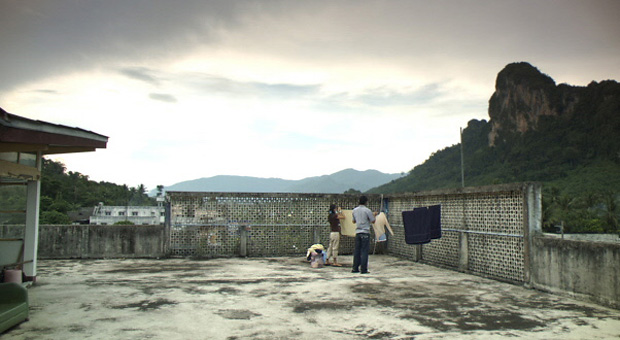You have no items in your cart. Want to get some nice things?
Go shopping
A stranger rolls into town in a car carried by the force of a great wave, a wave that lives on in the memories and haunts the dreams of the local people. This is the moment that marks the opening to Aditya Assarat’s 2007 film Wonderful Town, a subtly nuanced film from Thailand. Ton is a young man working for a big-city architectural firm, here to supervise the new hotel resort being built along the beach. He checks into a small hotel in the town, further inland, owned and managed by Na, a young woman who has grown up here, and witnessed first-hand the terrorising wave that swept through the area in 2004.
Set on the mainland north of Phuket, in Khao Lak, traces of the tsunami are scattered throughout the landscape. The physical, emotional and psychological effects of disaster are so gently revealed with the camera, explored through the depiction of the subtle everyday objects and gestures that betray an imbroglio of tensions beneath the surface: a dried-out comic book, an old towel with a hole worn through it, every object tells a story and betrays the official narrative that things are getting back to normal. After checking into the hotel, Ton goes to visit the building site on the beach he is required to supervise. It is not clear but still apparent that things are not all as they seem here: the sea is calm and the sun shines, but the place is ‘haunted’. While Ton speaks with the men on site, children are revealed in the background of the shot, playing with plastic trucks, mimicking the work of the adults around them, playing at building houses.
Wonderful Town indeed fits within the tradition of art house cinema where the silence of understated gestures suggest more than a thousand words could: an open door, greeted by an open shirt and the most commonplace of comments, for example, could be forgettable but is in fact pregnant with all that remains unspoken between the two protagonists, who are bound to start an affair.
The way that this film probes questions of the legacies of catastrophe—who witnesses such events and how—as well its palpable chemistry between Ton and Na, recalls Alain Resnais’s masterpiece Hiroshima Mon Amour, but whereas the relationship between ‘she’ and ‘he’ apparently bursts with intensity, Ton and Na’s affair simmers under the surface and fizzes up over time (the difference, perhaps, between an atomic bomb blast and a rapidly rising wave). Back at the hotel she caresses his sheets and his pillows in his absence, she listens through the door to him in the shower, wrapped in the new towel that she has given to him. The reality of her feelings, however, prove to be more difficuly for her to handle. The indirect intimacy with his belongings, and through their dialogue, portrays a different kind of romantic tension.
This deceptively simple film effectively comments on the politics of development, of international relations and globalisation on traditional communities. There is an obvious irony to the big-city architect’s comment that he enjoys the ‘peace’ of this small town that he has come to help rebuild after it has been devastated. He seems unaware that the same small town is dreary, stifling and even disturbing to others around him. Wonderful Town considers what our environments mean to us and why. The city feels at first to be a place of freedom, choice and opportunity—although far from a perfect existence—whereas the ghosts of the past and their associated obligations only haunt these small towns. Na is looking after her nephew, raising him as if he were her own. Her brother survived the tsunami but he is ‘the only one still drowning here,’ unable to live a life without crime in a town with dwindling economic prospects. Ton meanwhile declares he isn’t ready to have any kids—it’s a responsibility that he cannot, he chooses not to, deal with right now. She lives a life dictated by bed sheets and towels. He is a free spirit, free of burdens, or so he says, as it is revealed that he too is haunted by something in his own past.
What is it that remains after a disaster? What does recovery look like? What does it feel like? It is surely messy, chaotic, and yet all the while we pretend that life just goes on the way that it always has, the way we’d like it to. A routine of bed sheets and towels keeps the days moving on for Na, as she explains. But sometimes things happen that we can’t control, things cannot carry on the way they were; sometimes another disaster comes with a new set of unexpected challenges.
Where there is destruction, however, there is the possibility for new beginnings. Hotels can be a place of emptiness that lacks meaning—for a storyteller, they can be perfect devices for narrative. In this film the hotel, as well as being a symbol of development under globalisation, is a site of transition and impermanence, of a temporary existence between one place and the next. It is a place free of responsibility, at least for the guests. A hotel will be the location for their love affair, but she will remain, forced to live on in the wake of their affair and the sea’s wrath. Ultimately, it is a wave that both brings them together and separates them.
Wonderful Town is available to buy on DVD. If you are in the UK you can watch it on BBC iPlayer until Sunday, 19 November.

About Becky Ayre
Becky is a writer, editor and researcher of visual arts and the environment. She lives in Oxford. She works collaboratively with Inheritance Projects—a small group of independent curators and researchers that organise exhibitions, events, new commissions, publications and research projects. She blogs at Atmospheres of Uncertainty.




